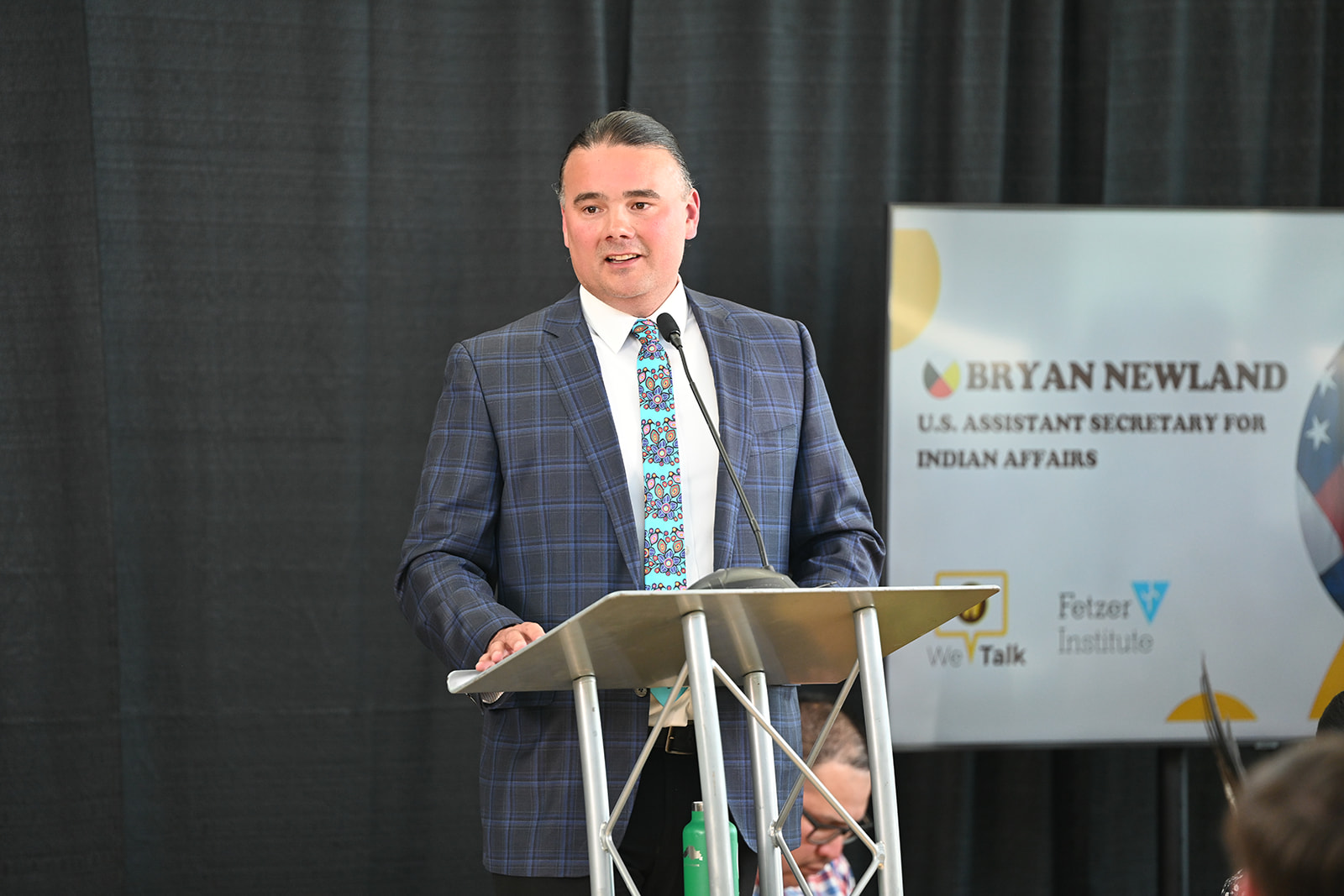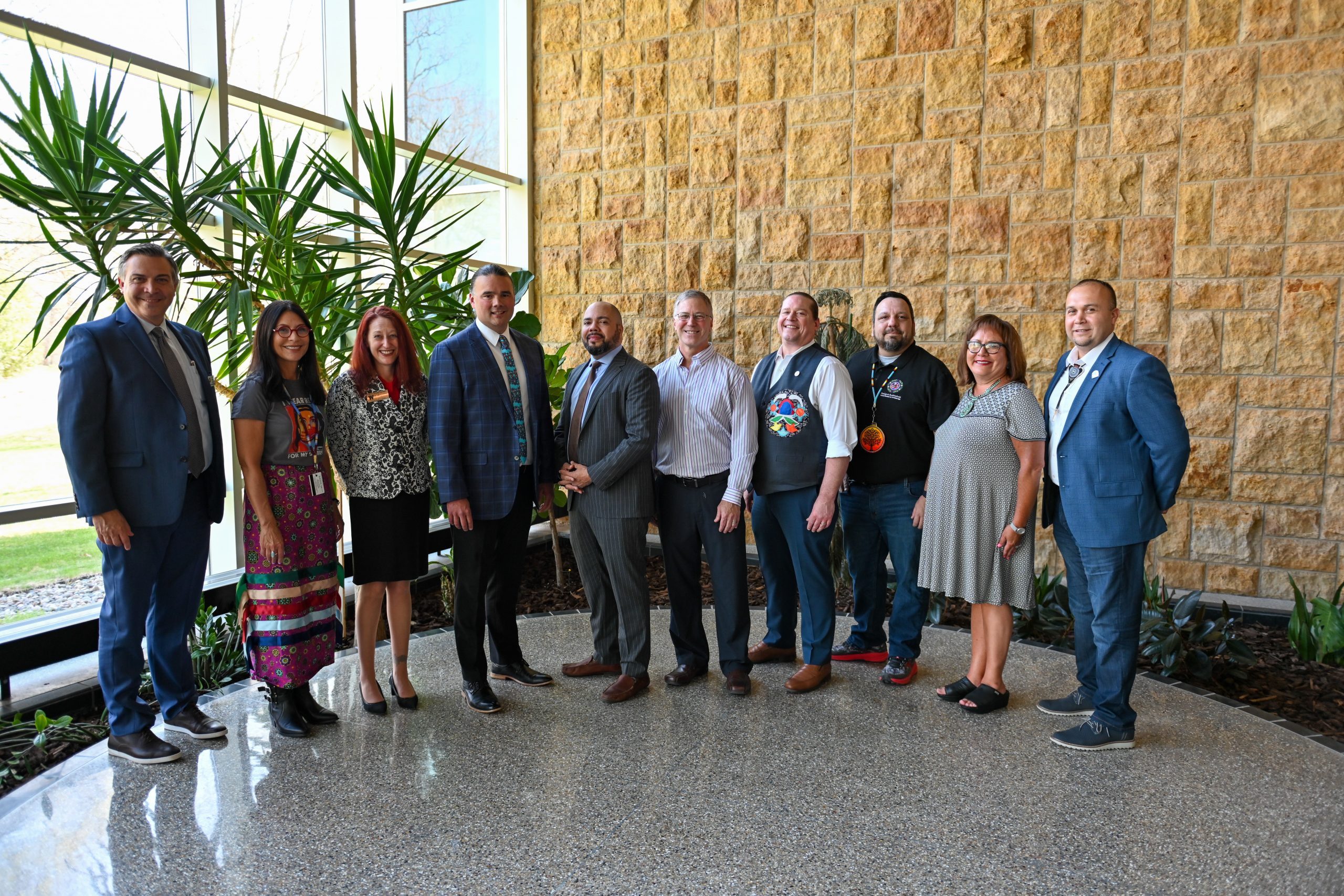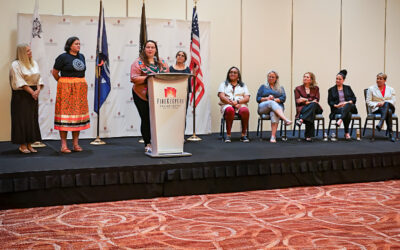Bryan Newland Speaks on His Career Pathway as Part of the University’s We Talk Series
With standing room only, a large conference room on Western Michigan University’s (WMU) campus was filled with anticipation and a sense of homecoming as local Potawatomi leaders welcomed U.S. Assistant Secretary of the Interior for Indian Affairs and Bay Mills Indian Community Tribal Member Bryan Newland back to his home state.
On April 13, 2023, Newland participated in WMU’s We Talk series, a civil discourse initiative introduced last year that the Fetzer Institute financially supports. According to WMU’s website, the We Talk series “seeks to expand educational opportunities to help people learn the skill sets and become receptive to resolving conflicting beliefs through intentional listening, rational actions and language, and empathy.”
After the Smudging ceremony and official greetings and introductions, Newland opened with gratitude: “I want to thank the fellow Tribal Leaders here; I know you work very hard for your People.” He individually thanked the Council members present, representing each of the three Sister Potawatomi Nations – NHBP Tribal Chairperson Jamie Stuck, Match-E-Be-Nash-She-Wish Pottawatomi Indian Tribal Councilmember Ben Brenner and Pokagon Tribal Chairwoman Becky Richards. Newland himself served as Tribal President for the Bay Mills Indian Community from 2017 until 2021, until his appointment to his current role within the federal government.

Like each of the Tribal leaders who introduced him, Newland also congratulated WMU on its new Tribal Governance Graduate Certificate Program, as a “way to train the next generation of Tribal Leaders… Having been a Tribal president and someone who has worked with Tribes across the country — as Tribal Councilwoman for Pokagon Becky Richards said — there really isn’t a blueprint for how to work with a Tribal government, and is more you just kind of learn as you’re doing. Tribal governments can be even more complex than the federal government.”
Having worked within many levels of Tribal governments as well as the federal government, Newland acknowledged many “lucky breaks” that occurred to help him rise to his current position of U.S. Assistant Secretary of the Interior for Indian Affairs.
“There are a lot of people who have professional success; a lot of them work really hard and deserve to be there, but don’t let anyone tell you that they pulled themselves up by their bootstraps and did it by themselves,” said Newland. “…If I hadn’t had a mentor take the time to write that letter of recommendation for me, if I hadn’t had that roommate who remembered me, if I hadn’t had that law professor by circumstance that I was able to meet, all these breaks made this moment here possible.”
Newland shared his humble upbringing in the Upper Peninsula, growing up on the Bay Mills Indian Reservation to teenaged parents, surrounded by a close-knit extended family. He spoke of his educational pathway, including his law degree in Indian Policy from Michigan State University College of Law, which greatly helped shape his political career and led him to serve as the highest appointed official who doesn’t require Senate confirmation.
Recognizing the audience’s curiosity about the federal government and its nuanced and complicated relationships with Tribes throughout the country, Newland stated that “the Constitution explicitly mentions “Indians” three times, the first time in Article 1, Section 8, Clause 3, where it includes that Congress has the power to regulate commerce among the states, foreign nations and the Tribes… The very first laws that this country passed after the Constitution was adopted dealt with Indian Tribes.”
“The supreme law is the Treaties with Indian Tribes,” Newland told the audience. “And that’s the source of the trust responsibility. The United States is supposed to act in the best interest of Indian people, and it comes from the Constitution.”
According to the Department of Interior’s website, “The United States’ trust responsibility is a well-established legal obligation that originates from the unique, historical relationship between the United States and Indian tribes. The Constitution recognized Indian tribes as entities distinct from states and foreign nations. Dating back as early as 1831, the United States formally recognized the existence of the Federal trust relationship toward Indian tribes.”
Newland explains that the term trust responsibility means, “With this course of dealing, in exchange for taking their land… So that’s where the trust responsibility comes from; the United States would place Indian People under the protection of the federal government. It didn’t always work out in the way we would want it, but I think things are changing, a little bit at a time, for the better.”

As a public servant within the federal government, Newland stated: “It’s a responsibility to serve in this capacity (as Assistant Secretary). We are the forward part of the federal government’s trust relationships. …We build relationships with 574 federally recognized Tribes in the United States… I oversee the Bureau of Indian Affairs, which just celebrated its 200th birthday, and is older than the Department of Interior or Education.”
According to Newland, things are changing slowly, especially under this current Administration.
He mentioned that the Biden Administration has seen “record investments of $45 Billion into Indian Country… in 20 months,” which is comparable to 15 years’ worth of BIA budget.
Newland spoke of the newly formed Missing and Murdered Unit created by Secretary of the Interior Deb Haaland in 2021.
“This unit is dedicated to coordinating investigations of all the missing and murdered people across Indian country that have gone without the attention that they need,” said Newland.
He also acknowledged the work around Indian Boarding Schools and the horrific stories of survival and loss he and his team have uncovered through letters and records. “We do it out of love,” said Newland of the emotional, yet meaningful, work his team must perform as they search for the truth.
Throughout his presentation, Newland relayed strength and humility, citing how the Seven Grandfather Teachings have provided him a pathway to living a more balanced life.
“Mno Bmadzewen means to live your life in a good way, and the roadmap to do that is through the Seven Grandfather Teachings,” said Newland. He highlighted certain points of each teaching, noting, “Truth is Débwéwen, when you speak, speak the truth…. Édbeséndowen {Humility} is to know you’re not above anything and to know your place in the world.”
At the end of the presentation, Newland was met with a standing ovation, as well as a sunrise blanket from The Native American Student Association (NASO) of WMU to express the audience’s gratitude to Newland for all his accomplishments, relationships and humility.




0 Comments